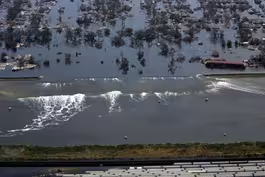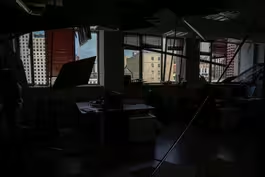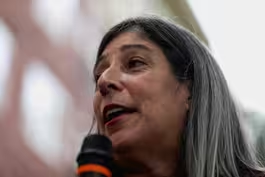
Why European countries want to reimpose sanctions on Iran
Clip: 8/28/2025 | 5m 30sVideo has Closed Captions
Why European countries want to reimpose harsh sanctions on Iran
Three European countries that were part of the 2015 Iran nuclear deal launched a process to reimpose sanctions that were lifted a decade ago as part of the agreement. France, Germany and the United Kingdom accused Iran of breaking its commitments, starting a 30-day clock that could end with Iran’s economy further squeezed, arms deals halted and foreign assets frozen. Nick Schifrin reports.
Problems playing video? | Closed Captioning Feedback
Problems playing video? | Closed Captioning Feedback
Major corporate funding for the PBS News Hour is provided by BDO, BNSF, Consumer Cellular, American Cruise Lines, and Raymond James. Funding for the PBS NewsHour Weekend is provided by...

Why European countries want to reimpose sanctions on Iran
Clip: 8/28/2025 | 5m 30sVideo has Closed Captions
Three European countries that were part of the 2015 Iran nuclear deal launched a process to reimpose sanctions that were lifted a decade ago as part of the agreement. France, Germany and the United Kingdom accused Iran of breaking its commitments, starting a 30-day clock that could end with Iran’s economy further squeezed, arms deals halted and foreign assets frozen. Nick Schifrin reports.
Problems playing video? | Closed Captioning Feedback
How to Watch PBS News Hour
PBS News Hour is available to stream on pbs.org and the free PBS App, available on iPhone, Apple TV, Android TV, Android smartphones, Amazon Fire TV, Amazon Fire Tablet, Roku, Samsung Smart TV, and Vizio.
Providing Support for PBS.org
Learn Moreabout PBS online sponsorshipGEOFF BENNETT: Three European countries that were part of the initial 2015 Iran nuclear deal today launched a process to reimpose sweeping sanctions on Iran lifted a decade ago as part of the agreement with the Islamic Republic.
France, Germany and the U.K. accused Iran of breaking its commitments from that deal, starting a 30-day clock that could end with Iran's economy further squeezed, its arms deals halted, and its foreign assets frozen.
Nick Schifrin is following this for us.
So, Nick, explain why these European countries are sanctioning Iran and why this is called a snapback.
NICK SCHIFRIN: It's called a snapback because the idea is to snap back those sanctions that you just mentioned that were lifted on Iran back in the 2015 nuclear deal.
Of course, President Trump withdrew from the deal back in 2018, but Germany, France and the United Kingdom did not withdraw from the deal.
And that gave them the ability today to send this letter about Iran that judges Iran -- quote -- "to be in significant nonperformance of its commitments under the nuclear deal."
The Europeans say Iran, one, exceeded the caps on its uranium stockpile or nuclear fuel.
That includes uranium enriched to 60 percent, one step below weapons-grade, that the Europeans said today -- quote -- "has no credible civilian justification."
Number two, the letter also says Iran restarted prohibited enrichment, and it says Iran -- quote -- "ceased to allow nuclear inspectors from required verification monitoring to the extent that the U.N.'s nuclear watchdog is not able to provide assurance of the peaceful nature of Iran's nuclear program."
In the last few days and weeks, Geoff, European officials made it very clear to Iran that they had to negotiate directly with the U.S., they had to allow inspectors all over the country, including those sites that the United States bombed just two months ago, and, three, Iran had to account for the 60 percent uranium that Iran and the U.S. say were buried in those sites.
But Iran did not take any of those steps.
And, therefore, you get snapback today.
GEOFF BENNETT: And how has Iran responded to the threat of new sanctions?
NICK SCHIFRIN: Iran's foreign minister and deputy foreign minister both released statements today.
They accused the U.S. and Europe long ago of failing to hold up their end of the nuclear deal, and therefore they said that it was -- quote - - "illegal" that they imposed snapback today.
They warned that their cooperation with those international inspectors, the only real window that we have into Iran's nuclear program, would -- quote -- "likely be stopped."
And Iranian hard-liners, Geoff, have long warned that if Europe proceeded with snapback, they would leave the Nuclear Proliferation Treaty, which obliges Iran to give access to international inspectors, but no follow-through on that threat today.
GEOFF BENNETT: So what happens now?
NICK SCHIFRIN: Well, as you said, there's a 30-day clock, at the end of which we would expect the Security Council to reimpose all those sanctions.
And they are punishing sanctions on Iran, although the U.S. sanctions, in fact, are even harsher than these U.N. sanctions.
But the diplomacy can continue in those 30 days.
Secretary of State Marco Rubio, also the national security adviser, released a statement today, and he said -- quote - - "Snapback does not contradict our earnest readiness for diplomacy.
It only enhances it."
Now, we talked to some experts today who echo that argument, and they say that today's step gives the U.S. leverage to make a deal.
Take a listen to Elliott Abrams.
He was a special representative for Iran and Venezuela in the first Trump administration.
ELLIOTT ABRAMS, Former U.S. Special Representative For Iran: My view is that the Iranians don't negotiate in good faith without pressure.
So, if you think that there is a possibility of a negotiation with the regime, then I think you have got to keep the pressure on it up.
If the pressure is released, they're just going to walk away from a serious negotiation.
NICK SCHIFRIN: But you heard Iran's threats about ending cooperation with international inspectors, perhaps leaving the Nuclear Proliferation Treaty.
And other experts believe that this step by the Europeans today to initiate this snapback undercuts the possibility of a successful negotiation.
Take a listen to Jennifer Kavanagh.
She's with Defense Priorities, a think tank that advocates for restraint around the world.
JENNIFER KAVANAGH, Defense Priorities: I think that having more pressure placed on them will push Iran further from the negotiating table with everyone.
And it also creates domestic pressure.
The Iranian regime can't be seen by its domestic public to be giving in now to pressure from Europe or additional pressure from the United States.
It forces the Iranian regime to take steps like threatening to pull out of the nuclear nonproliferation regime and other types of drastic moves.
NICK SCHIFRIN: Geoff, a senior U.S. official tonight told me that was the debate that the U.S. was having internally before the 12-day war launched by the U.S. and Israel, that one side was arguing that, no, this could lead to less likely of a successful outcome, the other side saying, no, it gives us leverage.
But since that war, this senior U.S. official tells me tonight that most of those officials believe there is simply no downside to the snapback.
But, at the end of the day, there is also still no solution to the impasse that you and I have talked about four months.
Iran is still demanding it contain -- or continue its enrichment.
And the U.S. as part of any deal is arguing that Iran needs to stop enrichment.
And that impasse maintains even today.
GEOFF BENNETT: Nick Schifrin, thank you so much for this reporting.
NICK SCHIFRIN: Thank you.
Katrina's lasting impact and concerns over future storms
Video has Closed Captions
Clip: 8/28/2025 | 9m 43s | 20 years later, a look at Katrina's lasting impact and concerns over future storms (9m 43s)
Man speaks after wife's ICE detention led to hospitalization
Video has Closed Captions
Clip: 8/28/2025 | 7m 2s | 'We felt ambushed,' man says after wife's ICE detention led to hospitalization (7m 2s)
Minneapolis mourns lives lost in Catholic school shooting
Video has Closed Captions
Clip: 8/28/2025 | 7m 12s | Minneapolis mourns 2 children killed in Catholic school shooting (7m 12s)
News Wrap: Russian drone attack on Kyiv kills at least 18
Video has Closed Captions
Clip: 8/28/2025 | 8m | News Wrap: Russian drone attack on Kyiv kills at least 18 (8m)
N.H. arts groups face budget blow as state slashes funding
Video has Closed Captions
Clip: 8/28/2025 | 7m 49s | New Hampshire arts groups face double budget blow as state slashes funding (7m 49s)
'Public health is in trouble,' says former CDC official
Video has Closed Captions
Clip: 8/28/2025 | 7m 14s | 'Public health is in trouble,' says high-ranking CDC leader who resigned in protest (7m 14s)
Providing Support for PBS.org
Learn Moreabout PBS online sponsorshipSupport for PBS provided by:
Major corporate funding for the PBS News Hour is provided by BDO, BNSF, Consumer Cellular, American Cruise Lines, and Raymond James. Funding for the PBS NewsHour Weekend is provided by...

















